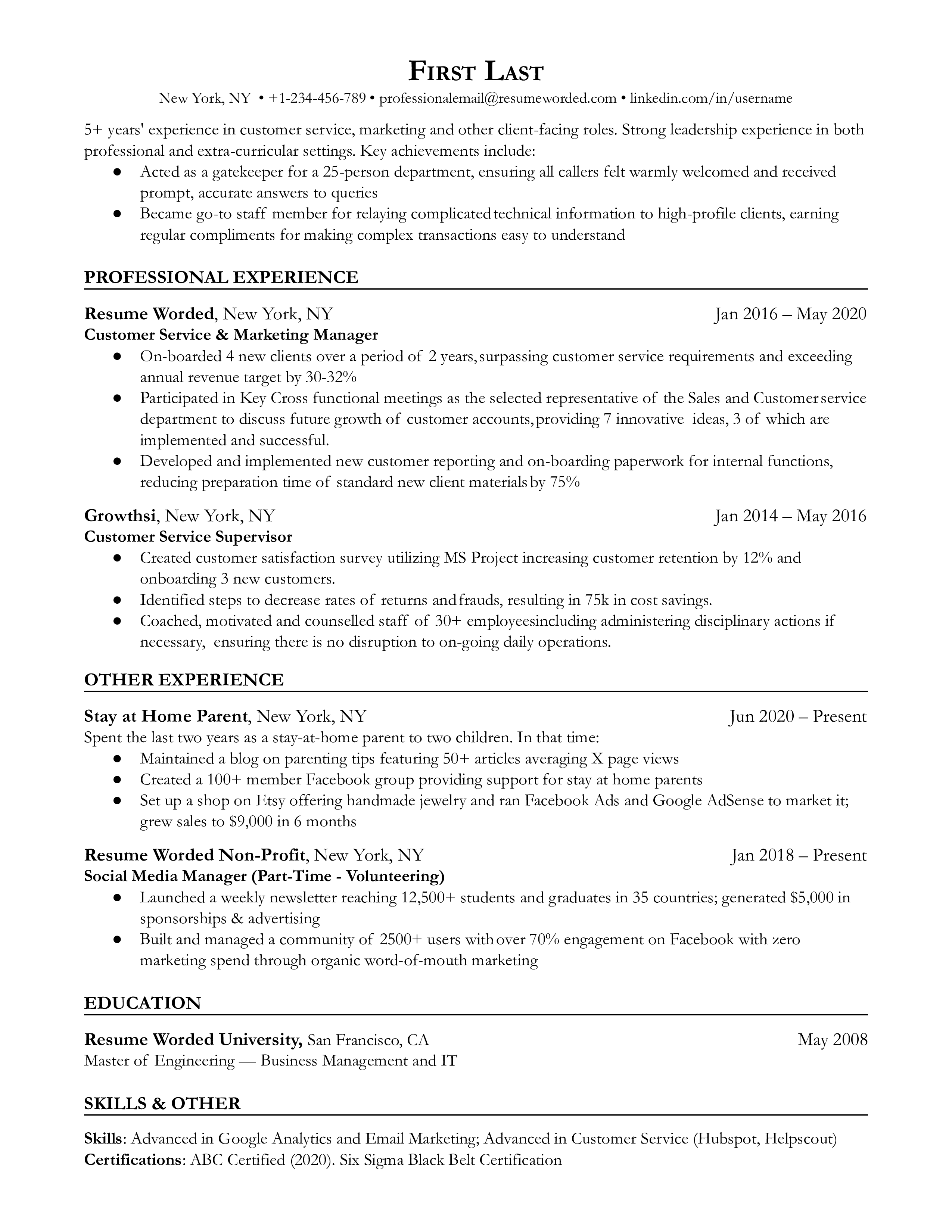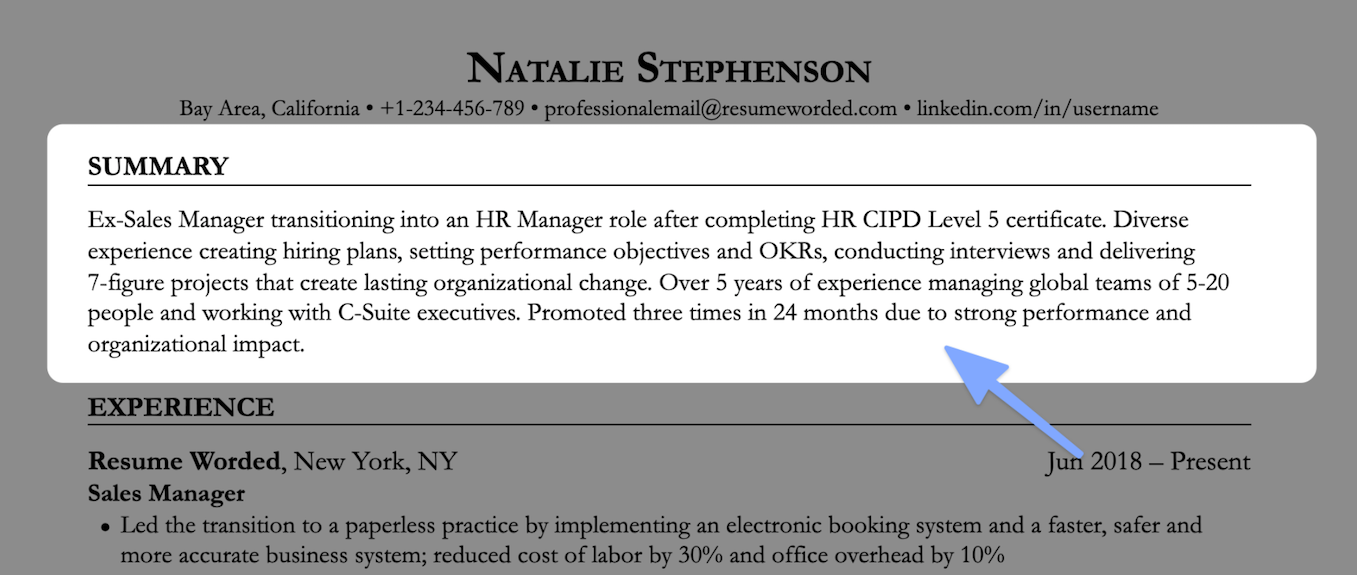Being a stay at home mom can present unique challenges when you’re ready to go back into the workforce. Employers will notice a gap in your employment, and your skillset or certifications may be out of date.
Fortunately, it’s entirely possible to craft a resume that puts your best foot forward, particularly if you take some time to build on your current skills. Read on to find out what you should be including and what to leave out - and for some helpful tips to keep in mind as you get ready to look for a new position. Plus, we've also included a free resume template in Word or Google Docs format that you can use as a starting point.
A free stay at home mom resume template
Before we dive in to our recruiter perspectives, here's a sample resume for a stay-at-home mom or parent. Feel free to use it as inspiration as you write your own resume (download links below).
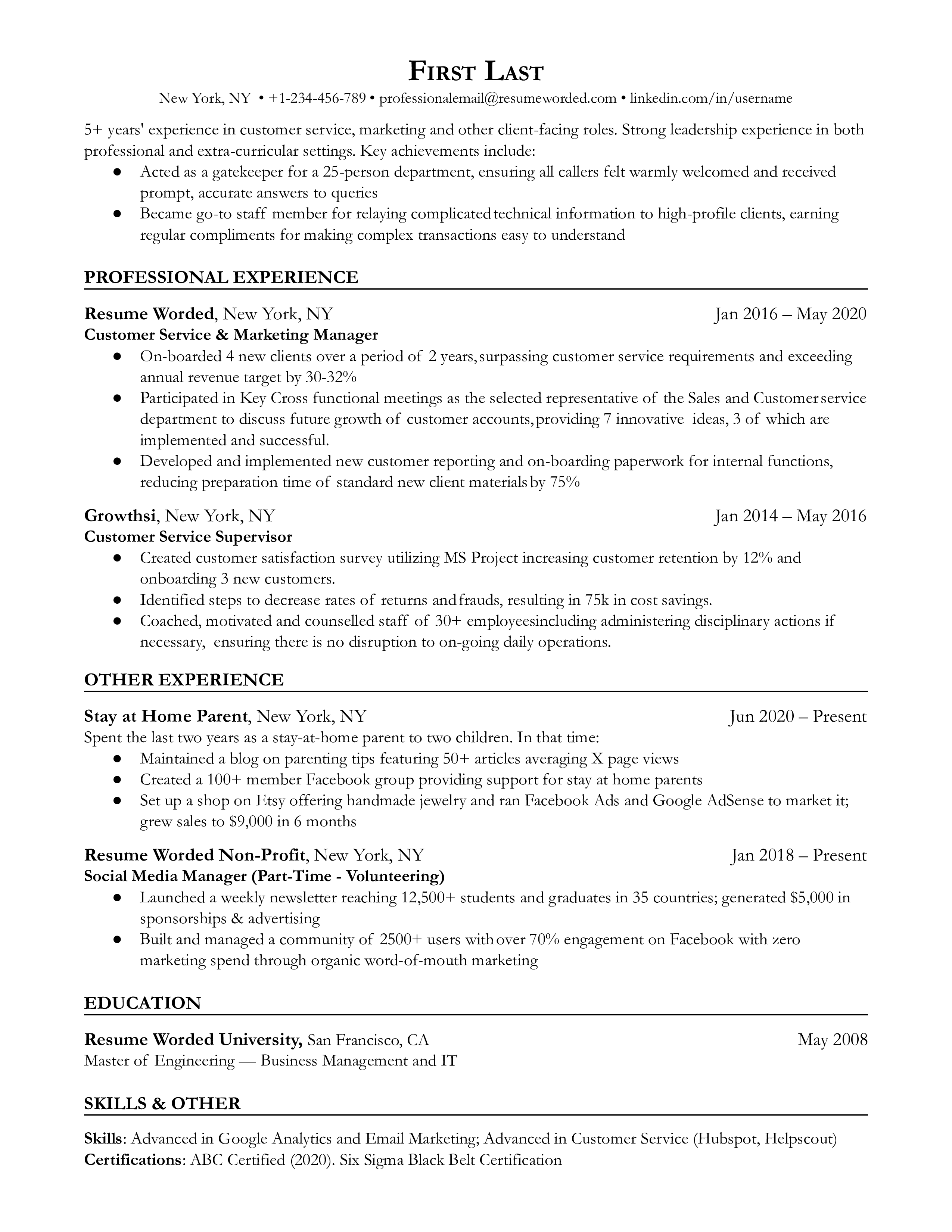
Download this free stay at home mom resume template: Google Drive | Microsoft Word
Mind your 'employment' gap
Do resume gaps matter? Sure — to some extent. Recruiters will want to know what's up with an employment gap, but it won't be prohibitive on its own. The key is to explain it, which is easily done when you're a stay at home mom (keep scrolling for detailed tips on how to do this).
Beyond the gap in your work with an employer, the most important thing to demonstrate to the hiring manager is that your skills are current. If you have done recent volunteer work, you should definitely include it. Freelance work that is related to the position you’re aiming at is also great to include.
If your skills aren’t current, read on to find out how to build your skills and add to your resume appropriately.
Read more: How to list gaps on a resume
How to list being a stay at home mom on a resume
If you want to include your work as a stay at home mom in your work experience, you should consider doing it in a format similar to this example:
Rather than “Growthsi” and the title below it, you could enter “Stay at home parent” (like in the following example), the dates of your time at home, and bulleted accomplishments along the lines of “Maintained a blog on parenting tips featuring 50+ articles averaging X page views” or “Created a 100+ member Facebook group providing support for stay at home parents” or how you’ve established and run an Etsy shop. Anything you include should be relevant to the job or position you’d like to apply for (with similar skills engaged).

Avoid including your stay-at-home mom experience as a 'work experience' or 'professional experience' — instead, like above, use an 'Other Experience' section title.
Read more: A stay at home mom's guide for getting back into the workforce
Building your skills while looking for a job as a stay at home parent
Just because you haven’t been with an employer for a while, you can still hone your skills, take courses, and potentially work on freelance projects during your job search. Each approach helps build your competency level in the eyes of hiring managers by demonstrating that you’re in touch with your skills.
Volunteer
One avenue to consider is looking for volunteer opportunities around your community. Non-profit organizations and parent/child-oriented groups are always looking for assistance with conducting outreach, fundraising, and holding events. If you’re interested in marketing, for example, helping to promote the Parent-Teacher Organization’s upcoming dance by creating and distributing flyers is definitely something you can include on your resume.
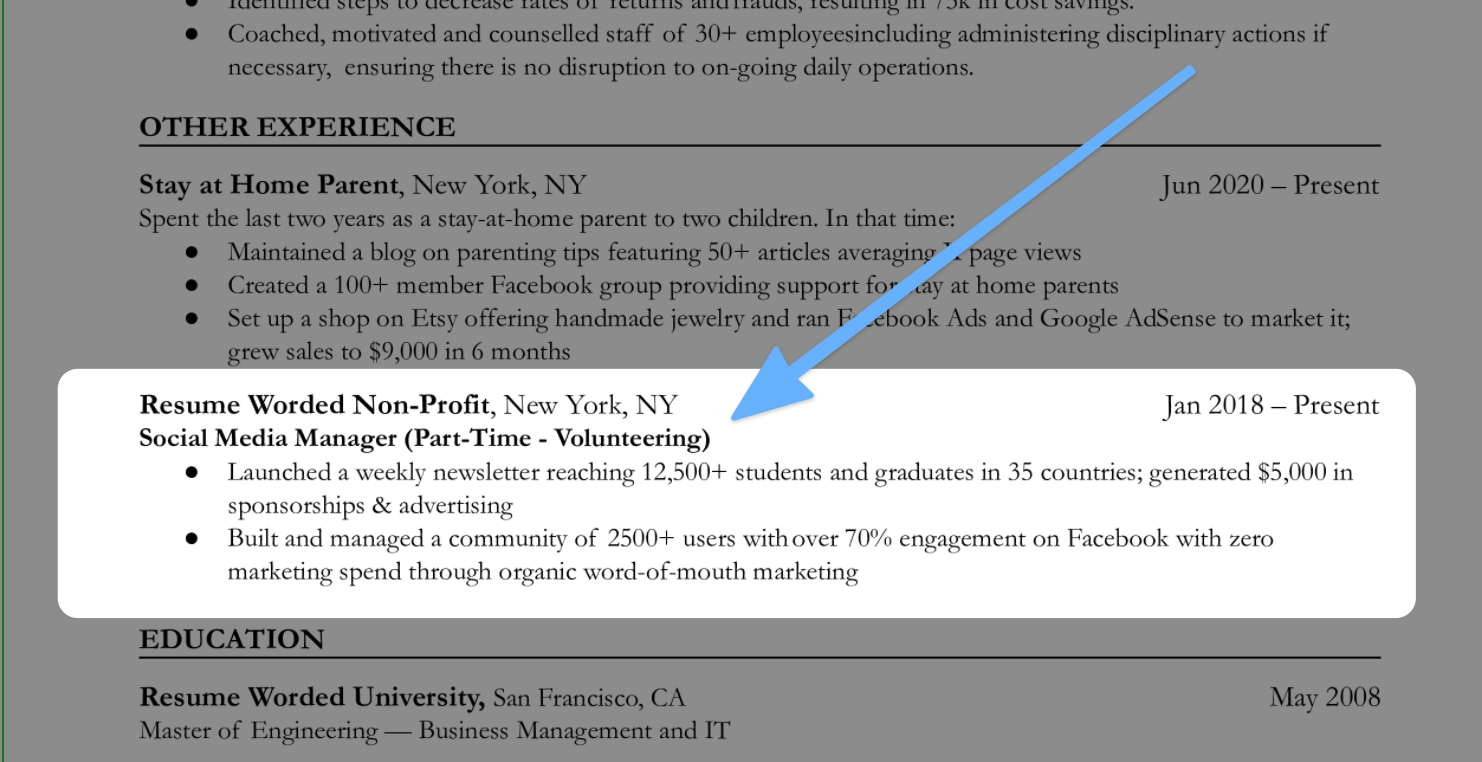
Read more: How to list volunteer work on your resume
Take a course
Depending on the field you’re interested in, it may help to look for relevant courses (either online or at nearby colleges). Some community colleges offer adult education courses to learn basic computer applications such as Microsoft Word, which will help with all kinds of office work. If you’re more advanced, you can look for courses in a wide variety of fields, from computer programming to graphics arts. If you have more time to invest, consider enrolling for a two-year degree if your field of interest would benefit from it.
Read more: How to list certifications on a resume (with examples)
Freelance work
Lastly, taking on relevant freelance projects (such as writing copy for online companies, conducting lawn or landscaping services, or programming simple applications) will give you experience and accomplishments that will highlight how you’ve kept your skills current.
Read more: How to list freelance work on your resume
Formatting Your Resume
For an easy and time-saving boost to formatting your resume, you can start with the template above or browse our ATS-ready resume templates. Pick one that appeals to your background and the position you’re applying for, and enter in the details as you go.
Resume header
Your resume header should include your full name, phone number, email address, location (state and country, not street address), and potentially your LinkedIn profile. An example is below:
You can optionally include the job title of the job you're applying to in your resume's header.
Read more: What to include in your resume header
Resume summary
Having a summary at the top of your resume is a great way to introduce yourself as someone who “worked in [X field] for [x] years before taking four years off to raise two children”, as an example. Your summary can also encompass any recent activities or projects you’ve started, such as by stating “In that time, started a successful copywriting business with x clients”, or “started and maintained a babysitting business with x clients”.
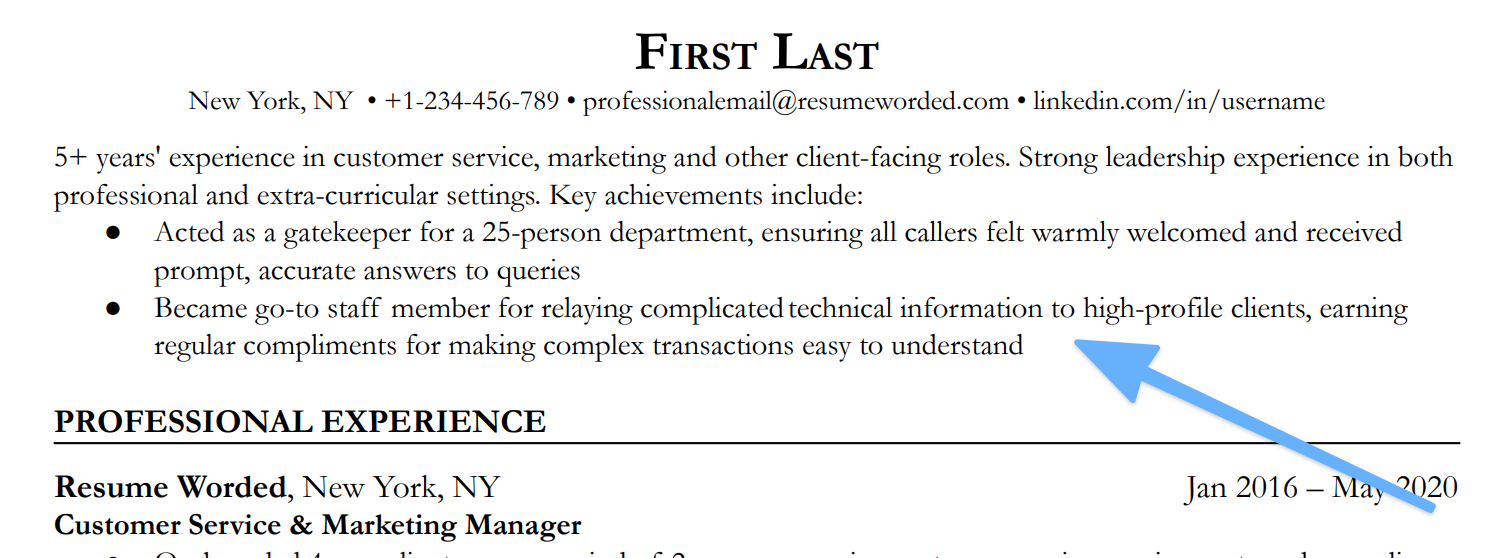
Read more: Resume summary generator
Work Experience
All of your work experience should follow the same style of format. Regardless of when you last worked, you’ll want to list your previous employers in reverse chronological order (with the most recent employers on top).
Each of your listed employers should be followed by a series of bullet-pointed accomplishments. Start the bullet points with strong action verbs that are related to skills you’ll be using in the position you’re going into, ideally. Whenever possible, include a numerical value (such as “improved sales by 10 percent over X years”) to help employers understand exactly how much of a difference you made.
For each of your work experiences, note the company or organization, your job title, and the dates you worked there. Usually, this means listing the month and year, though you can sometimes leave off the month and display only the year — what’s more important is that you’re consistent with how you format your dates within your resume.
Read more: How to list your work experience on your resume
Education
If you graduated some time ago (8+ years ago): Your education section should be short and underneath your work experience. In this case, just include your degree name and your school name. You can leave off your graduation year to avoid any unwarranted age discrimination — something that unfortunately happens in today's hiring landscape.

If you returned to school or you graduated recently: You should list your education at the top of your resume if you recently completed a degree (while being a stay at home mom). Include the name of the school, the degree you graduated with, and the program you graduated from. Depending on the type of degree you received and the position you’re planning to apply for, you may also wish to add in the most relevant courses that you took (such as “Data Analysis” or “Software Engineering”) if they include keywords that relate to the job you're applying to.
Read more: How to list your education on a resume
Resume skills section
If you have a sufficient number of technical skills, you should include a skills section on your resume. This could be placed at the right hand side of the page, or at the very bottom. The skills you list should be appropriate for the position you’re applying for. As an example, if you’re applying to be an office manager, you could list “QuickBooks”, “Microsoft Office”, or “Google Calendar” as your skills. If you’re going into graphic design, list the programs you’ve worked with before.
For all of your skills (in the summary, body of your resume, and skills bank) you should aim to include ones that align with your background and the job you’re applying for. Refer to this list of resume skills and keywords to get an idea of what hiring managers and automatic screeners are looking for.
Chances are, being a stay at home mom has given you a host of transferable skills (such as time management, communication skills, and follow-through). You should definitely work these into your resume if you can, but remember to not list them directly into your resume — e.g. don't mention 'time management' skills, but show how you have delivered a project that required strong time management.
Read more: How to write a resume skills section
What to Avoid
While it may be tempting, particularly if you manage a complex household or go above and beyond in your daily duties, you should refrain from listing “Head of Household” or “CEO of Household” in the body of your resume. No matter how elaborate your work in this role, claiming it as job experience means you risk signaling to the hiring manager that you hold your household to be equivalent in the scope of duties and level of accountability as you would a business.
Generally speaking, CEOs of businesses hold much greater responsibility (from the business’s perspective) than heads of households, and significantly more financial risk is involved.
With that said, if you have made a spreadsheet to manage your family’s finances, you can definitely include Microsoft Excel in your technical skills. You may also be able to work it into your cover letter to demonstrate your commitment to organization.
Optimize and Fine Tune Your Resume
Once you’re finished building the bones of your resume, you can use a few different tools to optimize it and make adjustments that will enable it to get past automatic screeners.
Get feedback on your stay-at-home parent resume
As a stay at home mom, you can write an effective resume by highlighting any volunteer work, online courses, freelance work you did while being a stay-at-home parent. You should also use your past work experience and stay at home experience to highlight your soft and transferable skills. Once you’re done writing your resume, upload it to the tool below — this AI-powered tool will analyze your resume, highlight any trouble spots, and make recommendations in a quick and easy process.
Tailor your stay-at-home parent resume
If you know the job you’re applying for, Targeted Resume is another free AI-powered tool that will enable you to tailor your resume to that specific position. The tool will assess your resume based on the job you’re applying for and let you know what skills you might be leaving out.
Another good way to quickly target your resume to the job you’re applying for, is by including relevant keywords on your resume. Use the tool below to get a list of keywords relevant to the job.
General Tips for Your Job Search
Going back to work after taking time to care for your family is a big step, but keeping these tips in mind can help make it easier.
Network
Your personal network could be your biggest resource when looking for a job. As many as 80 percent of people have gotten a job through someone they know, meaning that it would behoove you to ask around among your acquaintances to see if anyone has heard of something in the field you’re looking for.
Use social media
If you don’t have a robust social network (as sometimes happens when your focus is fully on your children), don’t despair. Build your profile on LinkedIn (using similar techniques as you did with your resume) and start reaching out to people at companies you’d like to work for. Alternatively, consider attending in-person networking events with your local Chamber of Commerce or those hosted at businesses themselves.
Go at your own pace
Looking for a job at any point in life can be stressful, so remember to care for yourself as much as possible during the job search. Reconnect with your family with ample quality time, during the job search and once you’ve secured a position. It can take time to get the ball rolling, but once you get back into the field, the soft skills you gained as a mother are bound to serve you well!

